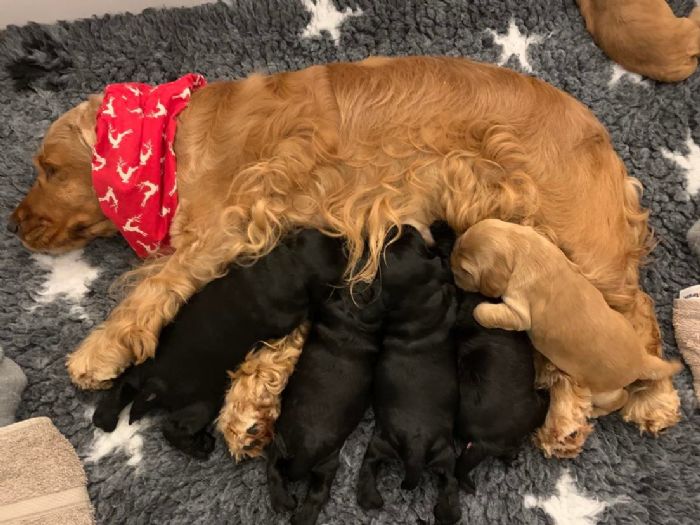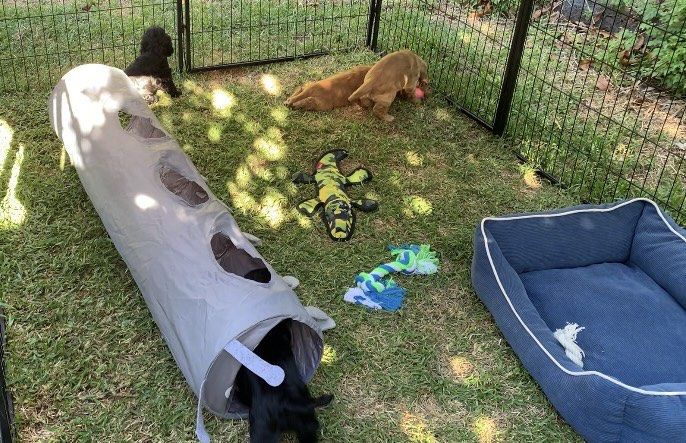PUPPY DEVELOPMENT

DEVELOPEMENTAL STAGES
The most important time in a puppy’s development is during the first year, especially during the first 4 months of life. By understanding the development stages, we can provide our puppies with what they need when they need it most, for optimal development!
FIRST 4 MONTHS
The Imprinting Period
Like children, puppies have a small window of time during brain development when they are most impressionable. This is called the Imprinting, or Critical Learning Period. For puppies, the imprinting period is during the first 16 weeks of life.
Puppies learn more during this time than they can learn in a life time. Therefore, the quality and quantity of what they experience will have a huge impact on their future personalities and determine the formation of many of their “good” or “bad” behavior tendencies.
In fact, such a vast change in development happens with each day that passes.
The Imprinting Period is further sub-divided into multiple distinct puppy-stages.
First 8 Weeks
(Neonatal Period, Transition Period, and 1st Socialization Period)
In the first 8 weeks of life, puppies gain use of all the senses, become mobile, start growing baby teeth, transition to eating solid foods, and become completely weaned (independent) from their mother.
Learning is already rapidly occurring, making it important that human caretakers provide puppies with specific neurological stimulation, a complex environment, and careful, yet thorough, socialisation for proper development and adjustment to living in their human environment.
During this time, there are also very critical lessons that the puppies must learn from their mother and siblings. Therefore, puppies should not be removed from their original homes before 8 weeks of age.
Stage 1: Neonatal Period at 0-2 Weeks
The first stage of puppy development is when they are born. At this age, puppies only have the sense of taste and touch and rely totally on their mother. Neonatal puppies have limited movement and are capable of only a slow crawl.


Stage 2: Transitional Period at 2-4 weeks

By this stage puppies have more senses developing, such as their hearing and sense of smell. They'll also start to have their puppy teeth coming through and their eyes will begin to open.
This is also the age when they start to develop their little personalities. They will interact with their litter-mates, wag their tails, stand, walk a little and are able to bark.
Stage 3: 1st Socialization Period at 4-8 Week
This is the most important stage of a puppy's development. It's also the stage where the most critical changes occur. During this period, changes start to occur rapidly.
4-5 Weeks of Puppy Development
Somewhere between 4 and 5 weeks puppies will start to become aware of their surroundings and will have the ability to develop a relationship with people.
During this developmental stage, breeders need to continue increasing the pup's exposure to different textures, sounds, smells, people etc.
.jpg)
.jpg)

Puppies should be exposed to unfamiliar day-to-day noises of a regular household such as TV, vacuums cleaner, dishwasher, washing machine, phones, talking, laughing, dropping things, you name it! You'd be surprised by how much noise we make on a daily basis. Puppies that are brought up inside will take all these noises in their stride.

Puppies enjoying play time outside in the tunnel in a safe environment
Once the puppies are at least 5 or 6 weeks old you should, if possible, ask the breeder if you can schedule a visit to see the puppies. Most good breeders recognize that the socialisation period has already begun and will gladly welcome future pet parents visiting the puppies.
If you do visit the puppies at 5 weeks old you're likely to see some fun stuff. At this age puppies are just learning to interact with each other and begin to play. They are also learning their doggie social skills as well as beginning to explore their ranking status within their pack.
Their curiosity is now starting to develop so they will be interested in you and may well nip at you as their biting skills are developing too.
Individual puppies can be given short periods away from their mother and siblings to help them get used to being separated. This is a small step towards helping a puppy feel less frantic when he has to leave his doggie family to go to a new home.
6-8 Weeks of Puppy Development
By this stage of puppy development, they will have full use of all their senses and will be getting ready for when they go home to their new owners.
Stage 4: 2nd Socialisation Period 8–16 Weeks
The optimal time for puppies to be placed with their new human families is at 8-9 weeks of age. As soon as your puppy comes home, time is of the essence for you to provide a huge heaping of high quality socialisation and schooling. This is the key to creating a socially self-confident, well-behaved puppy that is strongly bonded to you. It is also the key to preventing yappy, shy, and/or aggressive behaviors from developing later in life!
The puppy is about to take off on a huge learning curve, so it's the perfect time to start introducing your pup to some basic manners and puppy training. Start basic obedience at home, and then move onto a formal obedience class once they are fully vaccinated.
What you feed your puppy will have a long-term impact on his health and longevity. Feeding a good quality commercial dry food is a big step towards keeping them happy and healthy, and growing at the proper rate.
Also, never push your pup to do something that they are clearly terrified of - that will cause more problems than it will solve.

8-11 weeks Fear-Impact Period
During the 2nd Socialisation Period, when your puppy is around 8-11 weeks of age, it is important to be aware of what is known as a Fear-Impact Period.
Any fearful reactions are pretty normal at this age, and are usually nothing to worry about. You don't want to 'coddle' a pup who is behaving this way. Should your puppy become afraid for any reason, just maintain a positive attitude and use a happy, upbeat tone of voice so that they realize there is nothing to be scared of.
8-16 Weeks of Puppy Development
Bringing your puppy home (usually between 8-12 weeks) is right in the middle of his socialisation period. Therefore, it is vital that you introduce your puppy to as many new dogs, people, objects, sounds and surroundings as you can. BUT, make sure you do so in a controlled manner. Also, handling of the feet and body parts is a good thing for a puppy to experience at an early age as well as brushing and grooming.
It's also vital to balance their need for socialisation against health risks. Your puppy is very vulnerable to disease at this point in their life, so NEVER allow an unvaccinated puppy to interact with other pups or dogs who are not FULLY immunized, also don't give them access to any public areas such as parks, stores, sidewalks etc.
If you have another dog at home you should make sure you introduce your puppy to your existing dog on neutral territory.
When bringing a new puppy home it is also important that you puppy proof your home for the sake of your puppy and your possessions! It is also a good time to start a program to get your puppy used to being left alone to avoid separation anxiety from developing.
From the age of 7 weeks, puppies are more than capable of being able to be house-trained so make sure you start them off right.
At this phase of the puppy development, puppies are developing their reactions to things a lot more. They are also likely to focus more on different types of people and they should be friendly and approachable to strangers.
During this time they are also going to practice their biting skills a whole lot more! Previously they would play and bite with their litter-mates. Puppies will yelp when another pup bites too hard which provides feedback to that pup to bite softer. You now have to try and mimic this behavior to teach your puppy not to bite. This is called bite inhibition and is quite easy to learn and teach your pup.
You'll also notice that they may start to wander off a bit as they are more curious and will probably look to explore their environment a lot more. Be prepared for this at this age. That cute little puppy that you could take out for a toilet break without a leash, now needs to be on-leash!
Puppies need firm guidelines and lots of love during this stage of development, and the ones to come!
They will be starting to venture further afield and grow in confidence which will sometimes push them out of their comfort zone. They may be a bit confused by their feelings and reactions.
Puppies need you to be calm and patient so that they don't get over-anxious or into trouble.
Everything they learn and experience while young will stay with them, and although the old saying 'You can't teach an old dog new tricks' isn't really true, it IS true that it's much easier to teach things to a puppy or younger adult dog

4–6 Months
Stage 5: Ranking Period
During this time, your puppy will gain more energy, and become more “mouthy” and restless from the discomfort of teething as the baby teeth begin to fall out and the adult teeth erupt. This will typically occur between 4-6 months of age, but sometimes lasts longer.
If you have another dog in your household you may start to see more ranking behavior from your puppy towards other dogs. You'll likely see them practicing their dominance and submission skills which they may well practice on you too. If you haven't done so already, make sure you start a training program with your pup. It’s great to find a good positive training school but it’s also vital that you practice at home on a regular (daily) basis.
At this age your puppy is going to go through teething so watch out as chewing is a big factor at this time. Before your puppy starts chomping on your furniture:
- Don't leave them unattended
- Make sure they have plenty of raw chewy bones or pigs ears
- Chew toys are also good
Things to remember when feeding bones:
- Bones should always be given raw. Never feed cooked bones as they can splinter and cause internal damage or obstruct the intestine.
- The bone should be large enough that the dog can’t fit it into its mouth whole. Don’t feed small, hard or sharp bones eg chop bones.
- Always give them under supervision and remove bones that are not finished.
- Where there is more than one dog in a household, bones can sometimes become the focus of potential tension, so feed the dogs separately.
You may also notice that there is blood on their toys and chews or in their mouth during the teething phase. This is because thier gums are sore.
Your puppy will also begin to acquire an adult coat and attain most of their height. During this time, they will also begin to become sexually mature.

2nd Fear-Impact Period
Starting in the 5th month of the Juvenile period, there may be a Second Fear-Impact Period that lasts for 3 weeks. This is similar to the First Fear-Impact Period. If it does not occur at this time, it will occur later during the Adolescent Period.
6–12 Months
Stage 6: Adolescent Period
Hold on tight—your puppy will now be attaining full “puppy power” and will begin to test their wings! This is usually a difficult time for many puppy parents, but can be a mess for those with puppies that missed early establishment of boundaries, socialization and training. Dogs go through adolescence much earlier than human teenagers, for small breeds this could be as early as five months old, with larger dogs its more likely to be nine or ten months old. Adolescence in larger breed dogs will likely continue until they are two or three years old with smaller dogs reaching maturity at about 18 months. Typically, the bigger the dog, the slower the development. Mentally and socially, a dog may be considered a puppy for up to 4 years!
Your puppy will be likely to have much more energy, spend more time exploring the environment, become easily distracted, and may even seem less interested in you and forgetful of their training skills. Just be patient, consistent, and supportive—make sure boundaries are still well in place, review your training, and continue building on your successes.
2nd Fear-Impact Period
(if has not yet occurred): Puppies that did not experience their Second Fear-Impact Period in the last stage of puppy-hood will experience it during the Adolescent Period. The Second Fear-Impact period is similar to the First Fear-Impact Period and lasts for approximately 3 weeks.
1–4 Years of Age
Stage 7: Maturity Period
By understanding what each stage involves with your puppy's development, you can get a good idea of what to expect, both developmentally and behaviorally. You'll also be better equipped to provide your puppy with the right care throughout each phase and reduce the risk problems.
Finally, providing a stable routine, consistency, positive training, and plenty of socialization and exercise you are more likely to produce a well-balanced and emotionally stable dog.
After all, it is these periods of a puppy's life that will shape their personality and character. Quite simply, puppy development affects behavior, and behavior, molds character.
.jpg)
Sources: Wonder Puppy, Dog Care Knowledge

